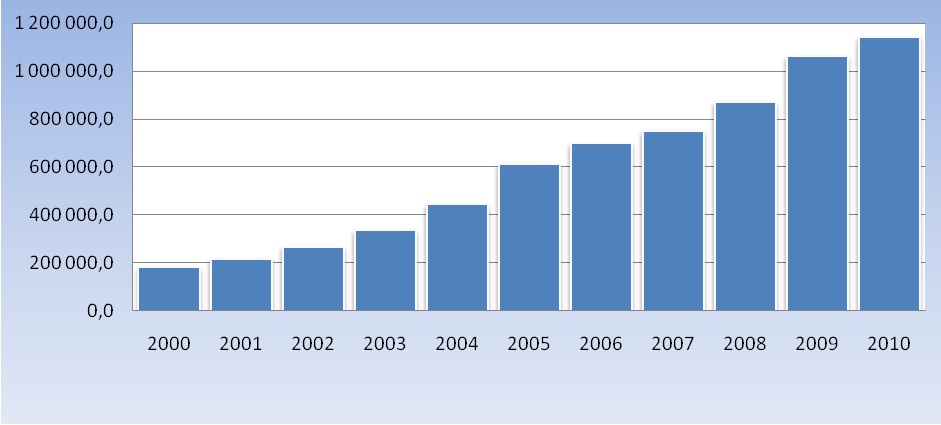People With Disabilities in Bulgaria: A New Approach to Social Inclusion (IME Report)
On April 16th 2012 the Institute for Market Economics (IME) released a report, analyzing the current regulatory framework and policies for the integration of people with disabilities. The report also proposes positive reform measures that, we believe, will better serve the purpose of full-fledged inclusion of such individuals. The full text (in Bulgarian) is available here.
According to the National Social Security Institute (NSSI), annual expenditure on disability pensions financed by the National Social Security (NSS) have risen from BGN 182.2 million in 2000 to BGN 1 142.7 million in 2010. Overall disability pension expenditures financed by Social Security and the state budget represent 20.3 percent of total pension expenditures in 2010.
Disability Pension Expenditures Financed by the NSSI (thousand BGN)

Source: NSSI
This significant increase is mainly due to the legislative and structural deficiencies of current policies for support and integration of people with disabilities. The latter have created incentives for abuse of public funds by attracting people who are not at risk from social inclusion to take advantageof the system, while at the same time failing to promote social inclusion and independent living of people with disabilities. To effectively address these problems, many of the current system’s anachronistic elements must be overcome.
Disability as a “social” phenomenon
In recent decades, international perçeption of “disability” has changed, as emphasis has been put on the concept of social inclusion of people with disabilities, rather than on their financial support as the main approach for their integration. This new approach requires complete reconsideration of many current policies and programs.
The upcoming reform of the system must have as its ultimate goals:
- Preventing abuse, which can only be accomplished by removing incentives for people, who are not at risk from social inclusion, to take advantage of the system. The deficiencies of current regulations produce distorted incentives, which in turn lead to abuse. The universal, in many ways, nature of the medical assessment as a means to acquiring a number of benefits and privileges must be reconsidered. Many of the latter have no regard for the social inclusion of people with disabilities, leading to inefficient spending of budget funds.
- The effective targeting of budgetary resources at the people who need them the most, which can be achieved through revision of current legislation by introducing quantity and quality requirements at the different levels of the system, thus conditioning access to different programs and privileges. The introduction of income-tested benefits will reduce the number of beneficiaries and will also increase the flexibility and adequacy of financial aid for integration.
What we propose:
1) Introducing a mandatory individual social assessment. Currently funds allocated on the basis of social assessment are a negligible part of total disability benefits. The scope of social assessment is limited and therefore ineffective. While medical assessment can determine the physical or mental deficiencies of a person, it is ineffective when used as means for the administrative allocation of social benefits. Medical assessment should be used mainly for the determination of the residual functional deficits of the person. In conjunction with its professional background and past experience (if any), the consecutive social assessment can help promote employment opportunities for people with disabilities.
2) Some universal benefits, such as road tax exemptions, should be reconsidered. Privileges that are granted to beneficiaries should not be automatic, but should be the result of an individual social assessment and should correspond to the person’s needs.
3) Participation in rehabilitation, employment and social inclusion programs should be a prerequisite for obtaining certain privileges and benefits.
4) Diversification of employment – encouraging programs of people with disabilities by clearly defining the target groups. Creating modules based on age, education, previous experience, personal qualification and other personal characteristics. A clear focus should be put on the employment of young people with disabilities. Early integration can help promote independent living among people with disabilities by avoiding early social exclusion.
5) Creating a system for promoting and financing individual integration plans, in partnership with representatives of employers from the private sector and NGOs.
6) Promoting employment for people with disabilities in standard work environment, rather than in specialized institutions. The latter are usually not able to provide the same opportunities for professional development and welfare.
7) Revision of current legislation regarding the protection of people with disabilities in the labor market. Currently it has more of a deterrent effect (i.e. prevents their employment), which ultimately affects economic activity and work opportunities for people with disabilities.


